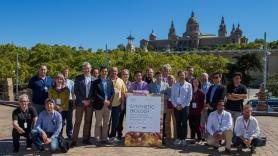To “improve” an existing living organism, scientists use a growing arsenal of techniques to modify the genome. These techniques, among other things, allow modified bacteria to manufacture malaria drugs, break down certain types of plastic or rearm the lymphocytes in our defense system to detect and fight certain types of tumors.
Some of the top international experts discussed the latest advances in this field at B·Debate, an initiative of Biocat and the “la Caixa” Foundation to promote scientific debate.
CONCLUSIONS:
- Synthetic biology seeks to design or redesign living organisms to carry out functions beyond those assigned to them by nature. It is a developing field in which advances in disciplines like biology, engineering, physics and mathematics interact
- There are two approaches to synthetic biology: top-down, copying and modifying existing genomes, or bottom-up, designing artificial life from scratch
- Modifying the genome of microorganisms has already allowed scientist to produce insulin in bacteria and use yeasts to synthesize malaria drugs. Some of the applications currently being developed include modifying cells in the immune system to attack tumors and using microorganisms to produce new antibiotics and recycle plastics
- Synthetic biology allows us to expand the genetic code, creating proteins that don’t exist naturally. This expansion will allow us to discover new functions and develop safer modified organisms that are unable to live outside the laboratory



